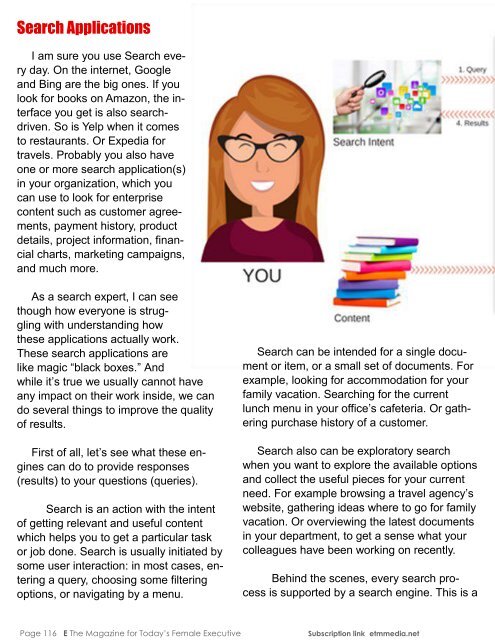E The Magazine For Today's Female Executive August 2018 issue
The theme for this month's issue of E The Magazine for Today's Female Executive is "Jump out of The Box!" Featuring Innovators and Social Change Agents. We have awesome book reviews, coaching series,
The theme for this month's issue of E The Magazine for Today's Female Executive is "Jump out of The Box!" Featuring Innovators and Social Change Agents. We have awesome book reviews, coaching series,
You also want an ePaper? Increase the reach of your titles
YUMPU automatically turns print PDFs into web optimized ePapers that Google loves.
Search Applications<br />
I am sure you use Search every<br />
day. On the internet, Google<br />
and Bing are the big ones. If you<br />
look for books on Amazon, the interface<br />
you get is also searchdriven.<br />
So is Yelp when it comes<br />
to restaurants. Or Expedia for<br />
travels. Probably you also have<br />
one or more search application(s)<br />
in your organization, which you<br />
can use to look for enterprise<br />
content such as customer agreements,<br />
payment history, product<br />
details, project information, financial<br />
charts, marketing campaigns,<br />
and much more.<br />
As a search expert, I can see<br />
though how everyone is struggling<br />
with understanding how<br />
these applications actually work.<br />
<strong>The</strong>se search applications are<br />
like magic “black boxes.” And<br />
while it’s true we usually cannot have<br />
any impact on their work inside, we can<br />
do several things to improve the quality<br />
of results.<br />
First of all, let’s see what these engines<br />
can do to provide responses<br />
(results) to your questions (queries).<br />
Search is an action with the intent<br />
of getting relevant and useful content<br />
which helps you to get a particular task<br />
or job done. Search is usually initiated by<br />
some user interaction: in most cases, entering<br />
a query, choosing some filtering<br />
options, or navigating by a menu.<br />
Search can be intended for a single document<br />
or item, or a small set of documents. <strong>For</strong><br />
example, looking for accommodation for your<br />
family vacation. Searching for the current<br />
lunch menu in your office’s cafeteria. Or gathering<br />
purchase history of a customer.<br />
Search also can be exploratory search<br />
when you want to explore the available options<br />
and collect the useful pieces for your current<br />
need. <strong>For</strong> example browsing a travel agency’s<br />
website, gathering ideas where to go for family<br />
vacation. Or overviewing the latest documents<br />
in your department, to get a sense what your<br />
colleagues have been working on recently.<br />
Behind the scenes, every search process<br />
is supported by a search engine. This is a<br />
Page 116 E <strong>The</strong> <strong>Magazine</strong> for Today’s <strong>Female</strong> <strong>Executive</strong><br />
Subscription link etmmedia.net




